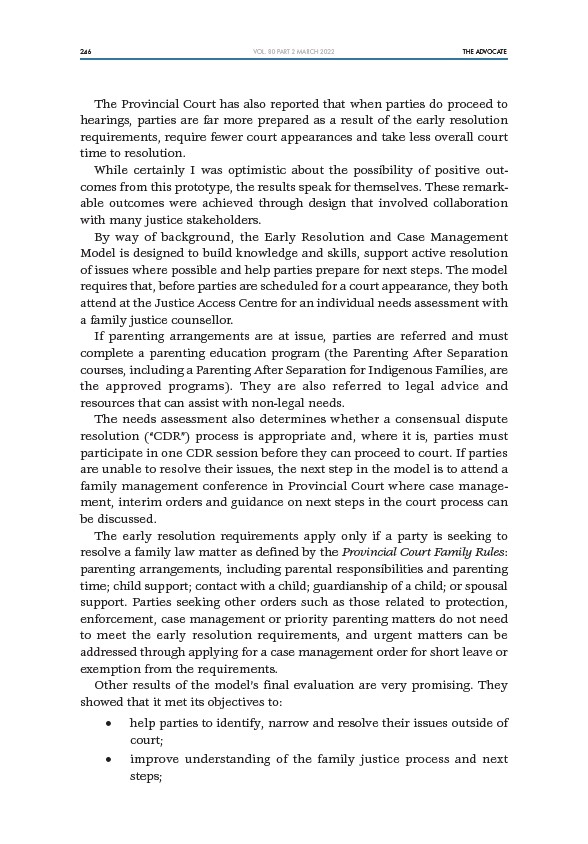
246 THE ADVOCATE
VOL. 80 PART 2 MARCH 2022
The Provincial Court has also reported that when parties do proceed to
hearings, parties are far more prepared as a result of the early resolution
requirements, require fewer court appearances and take less overall court
time to resolution.
While certainly I was optimistic about the possibility of positive outcomes
from this prototype, the results speak for themselves. These remarkable
outcomes were achieved through design that involved collaboration
with many justice stakeholders.
By way of background, the Early Resolution and Case Management
Model is designed to build knowledge and skills, support active resolution
of issues where possible and help parties prepare for next steps. The model
requires that, before parties are scheduled for a court appearance, they both
attend at the Justice Access Centre for an individual needs assessment with
a family justice counsellor.
If parenting arrangements are at issue, parties are referred and must
complete a parenting education program (the Parenting After Separation
courses, including a Parenting After Separation for Indigenous Families, are
the approved programs). They are also referred to legal advice and
resources that can assist with non-legal needs.
The needs assessment also determines whether a consensual dispute
resolution (“CDR”) process is appropriate and, where it is, parties must
participate in one CDR session before they can proceed to court. If parties
are unable to resolve their issues, the next step in the model is to attend a
family management conference in Provincial Court where case management,
interim orders and guidance on next steps in the court process can
be discussed.
The early resolution requirements apply only if a party is seeking to
resolve a family law matter as defined by the Provincial Court Family Rules:
parenting arrangements, including parental responsibilities and parenting
time; child support; contact with a child; guardianship of a child; or spousal
support. Parties seeking other orders such as those related to protection,
enforcement, case management or priority parenting matters do not need
to meet the early resolution requirements, and urgent matters can be
addressed through applying for a case management order for short leave or
exemption from the requirements.
Other results of the model’s final evaluation are very promising. They
showed that it met its objectives to:
• help parties to identify, narrow and resolve their issues outside of
court;
• improve understanding of the family justice process and next
steps;